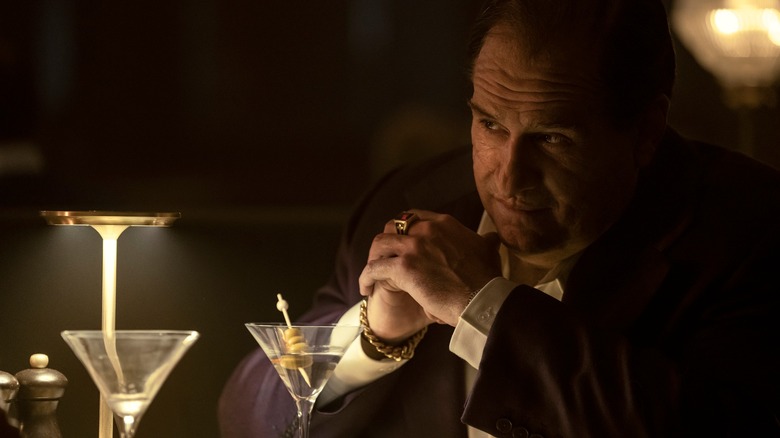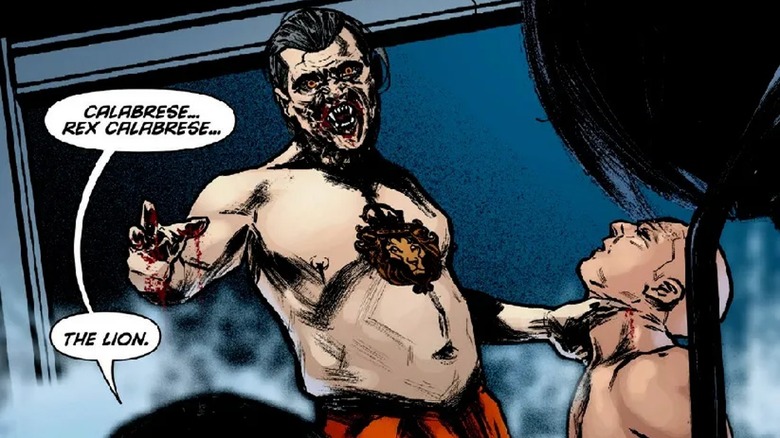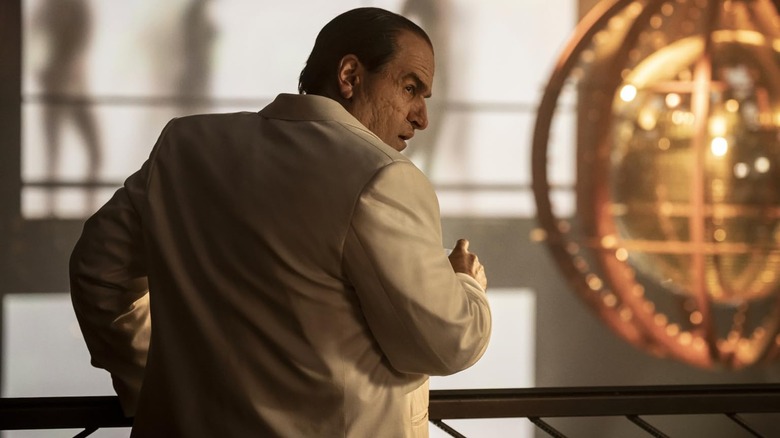The Penguin Episode 1 Easter Egg Has A Secret Connection To A Batman Villain
This post contains spoilers for "The Penguin."
Matt Reeves' "The Batman" ends on a note of tentative hope for our caped crusader, but the aftermath of the Gotham seawall bombing is a dire one. Gotham has always been a cesspool for crime, but the death of Carmine Falcone (played by John Turturro in the film, who is replaced by Mark Strong in the series) creates a power vacuum like never before. The post-bombing flood mostly affects the poor, leading to overcrowded settlements, and a rise in looting, supply of illegal drugs, and petty crimes. Well, what better opportunity for someone like Oswald Cobb/The Penguin (Colin Farrell) to quickly climb up the ranks of the criminal underworld, while Gotham is in such a singular state of disarray? Episode 1 of "The Penguin" miniseries plunges us into the heart of chaos, with the events taking place a week after the devastating explosion in Gotham Square.
Of course, the Falcone family does not lack heirs or successors, as the young, cocky Alberto Falcone (Michael Zegen) is poised to take over his father's seat and more than eager to prove himself. The first episode situates us within a confrontation between him and Oz (who is seen swiping blackmail material and jewels from a safe at the Iceberg Lounge) which soon turns into a conversation that acts as a catalyst for Oz's gradual rise to power. While conversing with Alberto, Oz speaks of a legendary gangster from his hometown — Rex Calabrese — in an attempt to explain the different kinds of power that can be wielded to command respect. This little easter Egg contains more layers than it seems, as the referenced Gotham mob boss has a personal connection to an established franchise character: Selina Kyle/Catwoman.
Let us dive deeper into Rex Calabrese's comic book history and how Oz's little anecdote about him spells doom for the Falcones, and Gotham at large.
A real old school type gangster in The Penguin
Rex Calabrese is not a super popular villain, as he was introduced fairly recently in 2014 "Batman Eternal #14," where he adopted the alias "Leo Leone" to evade Falcone's men after his rule as Gotham's criminal kingpin was overthrown. Thanks to his unassuming new identity, his time at Blackgate Penitentiary was most uneventful, until Commissioner Jim Gordon ended up sharing a cell with him after being wrongfully accused of murder. Calabrese revealed his true identity once The Penguin (who had risen to power amid the chaos) got into a fight with Falcone in prison while encouraging his daughter — wait for it — Selina Calabrese to take over Gotham and become a mob boss. She does.
Selina's relationship with Calabrese is a rebooted origin in the New 52 era of DC Comics, where she is abandoned by her father at a very young age and is left to shuffle through foster homes. The Kyle family eventually raises her, and she is unaware of her parentage until Calabrese reveals himself and urges her to leave behind her identity as a thief and embrace the mantle of kingpin. Before this rebooted origin existed, the comics always implied that Selina Kyle's biological father was none other than Carmine Falcone (explored at length in 1999's "Batman: Dark Victory" without conclusive proof), which is the exact thread Reeves pursues in "The Batman," with Selina (Zoë Kravitz) confronting Falcone just before his death.
As "The Penguin" is a spin-off of Reeves' film, the Rex Calabrese name-drop could be a cool Easter egg that also retcons his New 52 relationship with Selina, as it would complicate matters within the context of the film establishing Falcone as Selina's father. It is unclear whether "The Penguin" will revisit Calabrese down the line, or simply avoid any Selina-adjacent storylines in favor of revamped snippets from Jeph Loeb and Tim Sale's "Batman: The Long Halloween."
The Penguin uses Calabrese to flesh out Oz's motivations
The show intends to explore the myth surrounding The Penguin, where the layers of his persona will be slowly peeled back to grant us a glimpse into Oswald, who has more to him than vicious ambition and conniving ruthlessness. A sense of awkwardness is embedded into his character, wrapped in hidden pain and rage, which is actualized when he shoots Alberto without thinking. A crime of passion of this magnitude comes with repercussions, but Oz manages to maneuver his way around criminal underbosses and suspicious heirs while terrorizing a teen into doing his bidding. There are softer aspects to him, naturally, but these emotional facets are deeply intertwined with an all-consuming need to prove himself, no matter the cost.
When Alberto expresses doubt regarding filling his father's shoes, Oz does what a good subordinate would do: he schmoozes and affirms that he can while telling an anecdote about different kinds of power. He remembers Rex Calabrese with fondness, choosing to highlight his kindness towards the community instead of his unsavory nature, recounting how he would help people get a doctor or pay rent, and knew everyone by name. The point of Oz's anecdote was that true power and influence persist even after death, and he talks about how Calabrese's death was turned into a neighborhood parade as a gesture of love and respect. However, Alberto misunderstands his intent, and mocks him for comparing the Falcone legacy to some "small-time a**h***," while calling Oz's desire to be remembered the same way as "pathetic."
Of course, Alberto gets shot, as he makes Oz feel small, which is a sentiment he cannot stomach, as pointed out by his mother. Oz wants to live and die as a legend, revered even after death for his deeds. Although this seems sort of noble, at least by Gotham's standards, his motivations are bound to get more complex while he vies for a spot at the top: an empowering yet vulnerable position that only the most seasoned criminals can inhabit.


